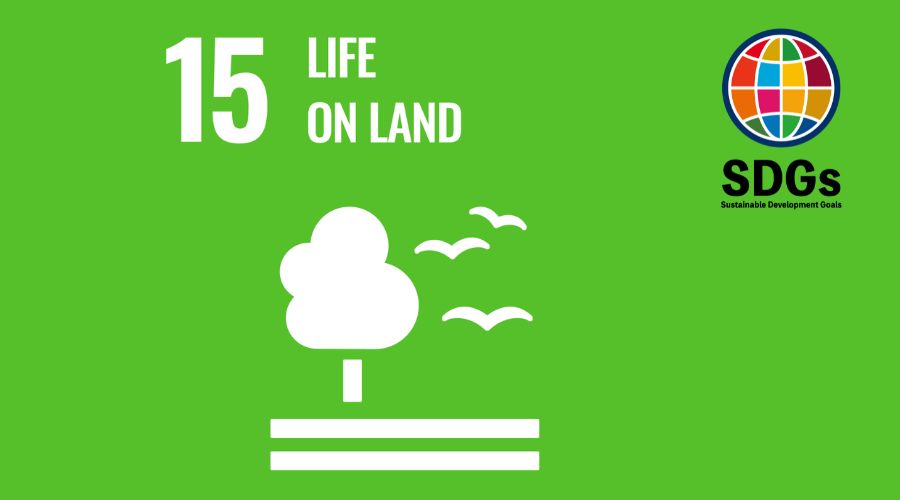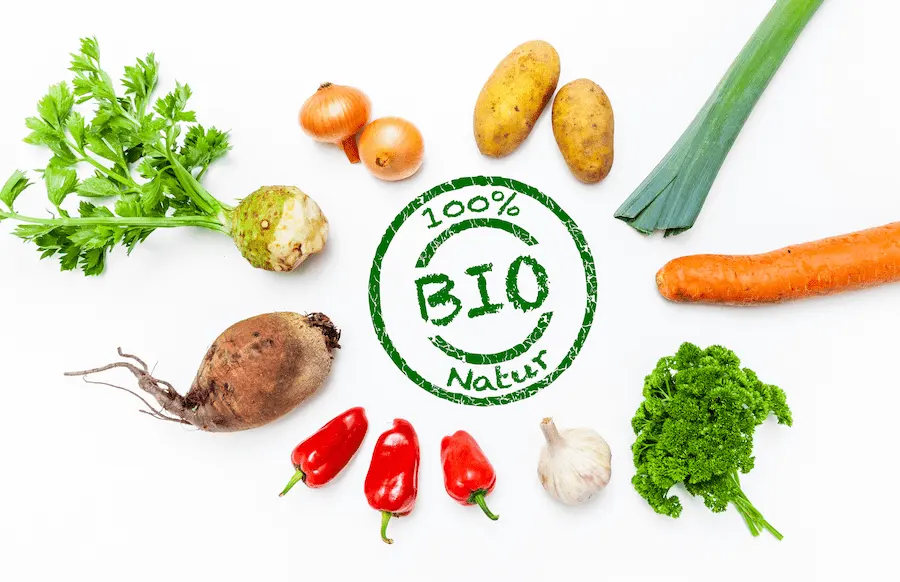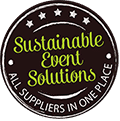Take a closer look at the 17 Sustainable Development Goals, or SDGs for short. Because integrating the SDGs into events is an important step on the road to greater sustainability. With conscious event planning and implementation of sustainable practices, your events can also make an important contribution to solving global problems and at the same time become a role model for sustainability. For this reason, we are presenting "SDG 15 - Life on Land" to you today.

SDG 15 - Life on land
SDG 15 stands for life on land. This Sustainable Development Goal is about:
- Protect and restore terrestrial ecosystems and promote their sustainable use,
- To manage forests sustainably,
- Combating desertification,
- End and reverse soil degradation
- and put an end to the loss of biodiversity.
This is what SDG 15 means for events
In particular, events such as festivals, conferences, and trade shows, which typically attract large crowds, can have a negative impact on the environment and natural resources. Potential impacts include:
- the change in biodiversity,
- Soil and water pollution,
- Waste and energy problems,
- Noise pollution
- and degradation of the local ecosystem.
Therefore, it is important that you, as a stakeholder in the event industry, also implement sustainable practices and methods to minimize the impact of events on the environment and contribute to the achievement of SDG 15.
If we want to achieve the goals of SDG 15, we need to design events in a way that protects natural resources and preserves biodiversity.

Events that lead by example
Hero Market
The Heldenmarkt is an annual trade fair for sustainable consumption. The event provides a platform for sustainable products and services that protect the environment and promote biodiversity. The organizers place great emphasis on sustainability and implement measures such as recycling, energy efficiency and the use of environmentally friendly materials.
Impact Festival
As Europe's first community-based platform, the Impact Festival aims to accelerate sustainable transformation by bringing together relevant players. The focus is on connecting innovators such as green startups with corporates and investors, as well as inspiring speakers. They focus on six innovation areas including agriculture, biodiversity and food.
Organic Festival
The Organic Festival strives to become the largest trade forum and the ultimate benchmark for both professionals and consumers. In addition, a rich and specialized program of special events will keep professionals informed about trends and developments in the industry, while consumers will gain greater knowledge and insight into organic food and the wider organic culture.

These immediate actions at events pay into SDG 15
Sustainable event planning
As an event planner, you should always implement sustainable events by choosing biodiversity-friendly options. Check all areas of the event organization and supply chains to see how you and all stakeholders can reduce the negative impact. Also look at how you can increase the positive impact. For example, by promoting biodiversity - in the choice of location, in purchasing, in travel, waste management, wastewater, cleaning, catering, stand construction, entertainment and much more.
Preserve biodiversity
You as an event planner or service provider can promote biodiversity by choosing sustainable venues. These are those venues that already take measures to preserve biodiversity. For example, they create habitats for wildlife, unseal parking lots, or plant insect-friendly beds.
Every event can make a positive contribution to biodiversity. For example, you can plant (or have planted) one tree per ticket, invest in the rewetting of moors or in sustainable organic farming. Also, go for sustainable organic catering. Pay attention to biodiversity in your compensation projects. You can also support local associations and organizations that provide insect-friendly planting and green strips.

Avoid products with palm oil, as it is known for significant environmental impacts. Conventional palm oil production is often associated with deforestation, habitat loss, soil erosion, water pollution and human rights abuses. This can lead to loss of biodiversity and habitats for endangered species, and threaten the livelihoods of indigenous peoples and local communities.
Choose sustainably produced foods such as certified and fair-trade dairy, meat and fish products, coffee, cocoa and chocolate. Well-known seals and certifications include MSC, WWF, Soil Association, Fair Trade, Rainforest Alliance.
Use renewable energy
Look for opportunities to use renewable energy at events.
Reduce insect mortality
Reduce insect mortality by reducing outdoor lighting and using LED bulbs that attract significantly fewer insects. In particular, choose those with a warm white light color up to 3,000 Kelvin for buildings and pathway lighting, for example.

Reduce resource consumption
As an event planner or service provider, you can reduce the consumption of resources at your events. Do without print materials, for example, and thus counteract deforestation. This also reduces waste at your events.
Ensure less waste and recycling
Reduce waste at your events by using (or allowing the use of) fewer disposable items, setting up recycling stations and using packaging made from sustainable materials, or even better, offering reusable systems.
You can reduce negative impacts by collecting organic waste separately and turning it into compost or biogas. The compost can be used as a natural fertilizer for plants. This helps to improve soil quality and promote biodiversity. In addition, biogas can be used as a renewable energy source, reducing the need for fossil fuels.
Make sustainability tangible
Make sustainability and the benefits of biodiversity tangible and consider this in all your communication. Also think about the "little things" do without cut flowers and buy locally grown organic food from now on.
Book artists and speakers who fit the target audience and are committed to sustainability and biodiversity.
Conclusion
When sustainable events become the standard, their high reach and variety creates enormous potential to change the world in a positive way! Events become part of the solution - be an active part of it.
More information
Sabine Böhling, consultant, trainer and lecturer for sustainability and CSR, and Stefan Lohmann, expert for live entertainment concepts and founder of Sustainable Event Solutions, present the 17 SDGs and apply them to events. This series first appeared on tw-media, the meetings industry.
- more about the 17 Sustainable Development Goals
- more about the 16 Steps Initiative


